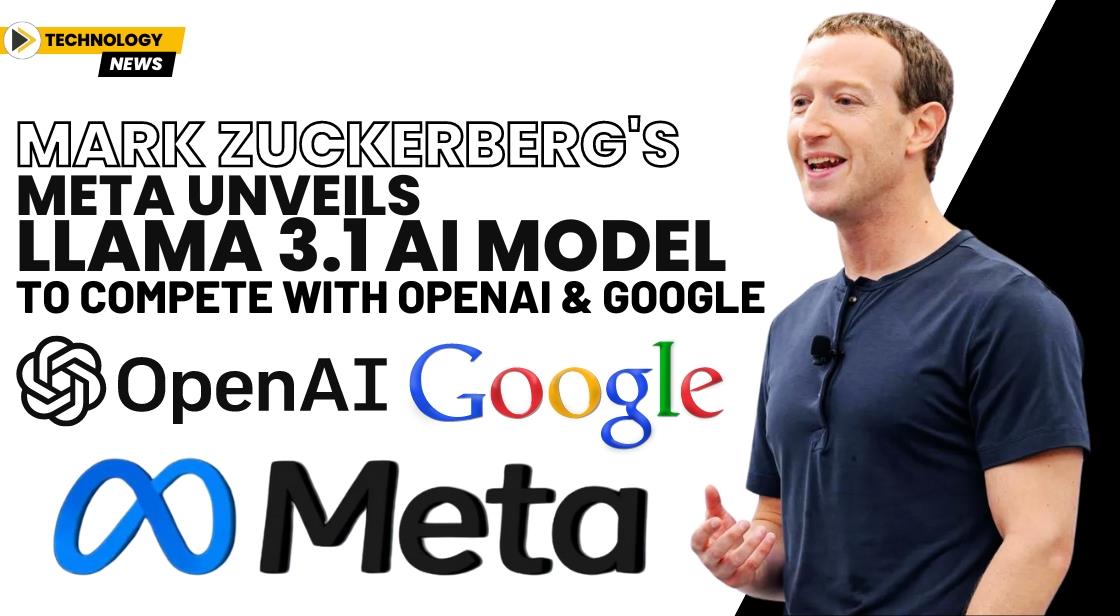Mark Zuckerberg's Meta Unveils Llama 3.1 AI Model to Compete with OpenAI and Google

News Synopsis
Meta, the parent company of Facebook, has taken a significant step forward in the race to develop the most advanced artificial intelligence (AI) with the release of Llama 3.1. This powerful new model, according to CEO Mark Zuckerberg, is "state of the art" and rivals similar offerings from competitors like OpenAI and Google's AI branch, Alphabet Inc.
Zuckerberg: Llama Among the World's Most Advanced AI Models
Developed over several months and requiring immense computing power, Llama 3.1 represents a substantial upgrade from its predecessor, Llama 3, released earlier this year. Zuckerberg emphasized the model's capabilities in a Bloomberg Originals interview, stating, "The Llama models that we're building are some of the most advanced in the world." He further revealed that Meta is already working on the next iteration, Llama 4.
Wide-Ranging Capabilities: Complex Math, Text Generation, and More
Meta highlights Llama 3.1's extensive new functionalities. These include improved reasoning abilities, allowing it to tackle complex math problems or instantly generate entire books of text. Additionally, the model boasts generative AI features that create images based on textual prompts. Notably, a feature called "Imagine Yourself" lets users upload a selfie that the model then uses to depict them in various scenarios.
Powering Chatbots and Meta's AI Assistant
Meta leverages its Llama models to power its AI chatbot, Meta AI, which is integrated into its apps like Instagram and WhatsApp, and also functions as a separate web application. Zuckerberg claims "hundreds of millions" of users currently utilize Meta AI, and anticipates it becoming the world's most widely used chatbot by year's end. He also expects external developers to utilize Llama for training their own AI models.
Open-Access Strategy: Fostering Innovation and Industry Influence
Despite the substantial investment in Llama's development, Meta offers the underlying technology for free public use, as long as users adhere to the company's "acceptable use policy." Zuckerberg hopes this open-access approach will establish Meta's work as the foundation for successful future startups and products, ultimately granting Meta greater influence on the industry's direction.
"If AI is going to be as important in the future as mobile platforms are, then I just don't want to be in the position where we're accessing AI through" a competitor, Zuckerberg remarked, reflecting on Meta's past reliance on Google and Apple for distributing its social media apps. "We're a technology company and we need to be able to kind of build stuff not just at the app layer but all the way down. And it's worth it to us to make these massive investments to do that."
Data Privacy Concerns: Balancing Openness with Proprietary Information
While pledging open access to Llama, CEO Mark Zuckerberg and other Meta executives remain tight-lipped regarding the datasets used to train Llama 3.1. He explained, "Even though it's open we are designing this also for ourselves." Meta utilizes publicly available user posts from Facebook and Instagram, along with additional "proprietary" datasets licensed from external sources, but refrained from disclosing specifics. He downplayed the advantage of training on Facebook and Instagram data, suggesting that competitors like Google likely have access to similar information through search engine indexing.
The AI Arms Race: Billions Invested, Future Dominance at Stake
Meta informed investors in April of plans to spend billions more than initially anticipated this year, with AI advancements being a primary driver. By year's end, the company expects to have roughly 350,000 Nvidia Corp. H100 GPUs, a crucial technology for training large language models like Llama and OpenAI's ChatGPT. These powerful chips can cost tens of thousands of dollars each.
The open-source approach has drawn criticism regarding potential misuse or the possibility of tech companies from geopolitical rivals exploiting Meta's technology to keep pace. Zuckerberg, however, believes closing off the technology would ultimately hinder progress.
"There's one string of thought which is like, 'Ok well we need to lock it all down,'" he stated. "I just happen to think that that's really wrong because the US thrives on open and decentralized innovation. I mean that's the way our economy works, that's how we build awesome stuff. So I think that locking everything down would hamstring us and make us more likely to not be the leaders."
He acknowledged that maintaining a multi-month lead over China might be more realistic than expecting years of dominance. However, he emphasized that even a small lead can significantly compound over time, securing a clear advantage.
Conclusion
Meta's release of Llama 3.1 marks a significant development in the ongoing AI race. The model boasts impressive capabilities, from complex problem-solving to creative text and image generation. By making the underlying technology open-source, Meta hopes to foster innovation and establish itself as a leader in the AI industry. However, concerns regarding data privacy and potential misuse remain. With billions of dollars at stake, the competition between tech giants like Meta, OpenAI, and Google is only likely to intensify in the years to come.
You May Like









